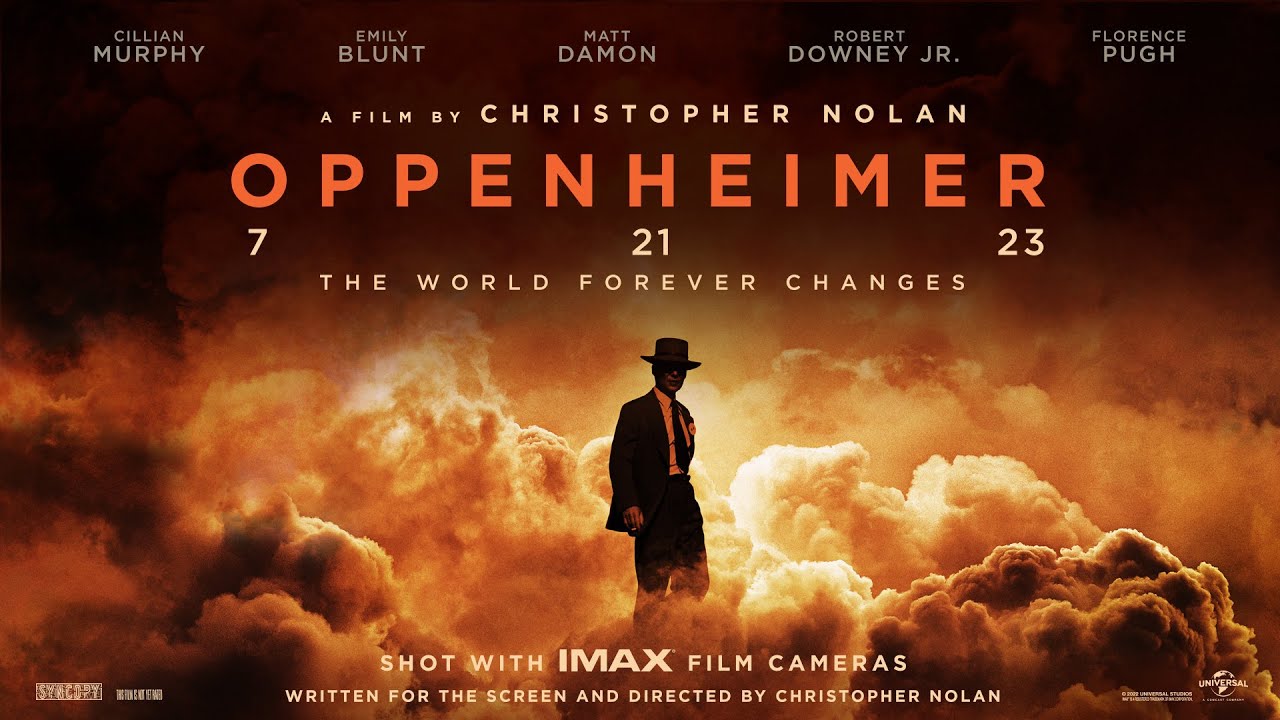Indifferent to the Barbenheimer hype, I went to see Oppenheimer because I was near a movie theater and had some time to kill after a short Friday at work. I can’t say I was blown away by the movie, but it was engaging enough that I felt the time passed quickly despite its long duration of three hours. The cast and acting was great, as it was to be expected from such a wide selection of famous actors – I spent a good bit of time trying to piece together in the back of my head who the actors onscreen were and where had I seen them before.

The movie had its ups and downs though in my opinion. The beginning was rather strange, between Oppenheimer’s visions of the quantum world and his offhand attempt to poison one of his teachers at Cambridge. I had the impression that this segment attempted to awkwardly rationalize Oppenheimer’s future involvement in the nuclear program by pointing to his neurotic side, a move I felt was unnecessary – and was thoroughly ignored later into the movie.
I enjoyed though that the portrayal of Oppenheimer and the world around him felt realistic, from his communist sympathies to his affairs (one in full view and longstanding, another simply hinted at) to his alcoholic wife, who evidently desired more from life than to be a mother and housewife and resented society for denying her those opportunities, to scientific details like his paper on black holes published on the same day that World War II began. Personally I loved that Oppenheimer’s famous quote from the Bhagavad Gita (Now I am become Death, the destroyer of worlds
) is introduced very early during a sex scene! And ironically some Hindu nationalists are protesting that choice – as if having a religious text accompanying sex is more unacceptable than the association with a weapon of mass destruction…
An astonishing fact during this buildup phase for me was how many of the scientists in Oppenheimer’s circles and later in the Manhattan Project were Jewish (6 out of 8 if information on Twitter is to be believed). It may point to the relative wealth of some Jewish families – after all, who could afford to have their sons pursue careers in fundamental physics at that time if not well-off parents? A bit of conversation with Strauss supports that conclusion, as Strauss remarks he is a self-made man and Oppenheimer admits his father is one too – possibly another reason for the resentment Strass bears against him.
The movie did a convincing job presenting the diverging opinions of various scientists about the creation of this doomsday device. Some, such as Einstein and Szilárd, were cautioning against its development. Others, led by Oppenheimer, embarked in the massive effort to build one, regarding the Nazi regime as a fundamental threat to Jewish people and the world as a whole, and assuming that that the Nazis were working on their own and had a comfortable head start. But within this group there were frequent disagreements as well, the more prominent between Teller, who argued for the creation of an even more destructive hydrogen bomb, and Oppenheimer who preferred to focus on the immediate task of solving the fission bomb first.
The most underwhelming aspect of the movie was, paradoxically, the atomic detonation. Christopher Nolan made a big deal around filming without any CGI for 70mm film or some other explanation I don’t get technically. Bottom line: it looked nothing like an atomic blast, more like gasoline fire with extra sparks sprinkled in. I’m sure he could have ditched the no-CGI purism for this single moment, because it dents the climax considerably. On the flip side, soon after we get to one of the best scenes in my opinion, as the collaborators at the site gather to cheer Oppenheimer after the news of the successful bombing of Hiroshima: the deafening crowd mirrors the explosion, the silence in Oppenheimer’s mind mixed with flashes of charred corpses mirrors the devastation in Japan. Writing this now, I realize that Nolan was right to emphasize this moment: the test itself wouldn’t have mattered that much in the grand scheme of things if the bombs dropped on Japan wouldn’t have had the expected impact, or didn’t convince the enemy to surrender.

The political scheming of the third act was interesting and complemented the story in a realistic way. No matter how much you strive for the interests of your country – and Oppenheimer does seem to be an earnest patriot in this movie – no matter your stature, there will always be some envious of your achievements, plotting to topple you from your pedestal and drag you through mud. Oppenheimer’s ties with the Communist movement are reexamined with an exceedingly critical eye, now that the Soviet Union becomes the archenemy and among suspicions that someone on the team leaked critical information to the soviets. The story jumps back and forth in time between the main plot and the deliberations of this secretive committee, but the overall progression of events felt very clear and enhanced the tension. I find it ironic that basically no one complained about this narrative device in this movie, while there were tons of moaning for the first season of The Witcher; maybe people should just put down their smartphones when binging at home and focus on what’s happening on the screen?
I loved the final scene as well, which revisits a short interaction between Oppenheimer and Einstein that had served as the spark for Strauss’ paranoia. This new perspective reminded me of an old adage: Great minds discuss ideas; average minds discuss events; small minds discuss people
. Essentially Strauss couldn’t fathom that others might have more significant issues to discuss than trash-talking him… A small issue I have is with how Einstein is represented in this movie, as a has-been, a scientist whose best work is so far in that past that he’s become virtually irrelevant, but I can accept it as Oppenheimer’s perception of Einstein – it is, after all, his biopic.
As a final note, I have seen some criticism that the deep beliefs of the central character remain a mystery, that the movie doesn’t present a clear-cut version of him. I had that impression myself, but I don’t think it detracts from the movie in the slightest. The point was to depict this man in his complexity and contradictions, which can look ambiguous and peculiar for any outside observer, and on that account I think the movie has undeniably succeeded.
Post a Comment